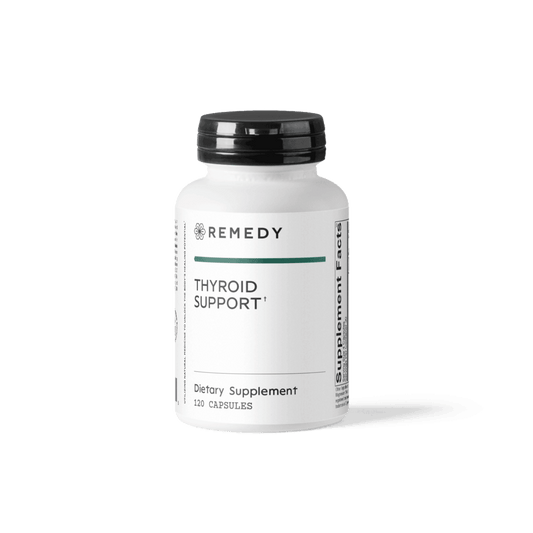Share
Thyroid conditions can range from sub clinical to full-blown autoimmune disease. If you have any of these warning signs, it may be time to check out your thyroid level.
Not everyone has normal thyroid levels. In fact, an estimated 20 million Americans already have a thyroid disorder. On top of that, 12% of all Americans will develop a thyroid condition during their lifetime. Unfortunately, it can be difficult to diagnose a thyroid disorder, which is why knowing the warning signs is important.
Symptoms of a thyroid disorder can range from mild to severe. You may have what is called subclinical hypothyroidism where your thyroid levels are just below the normal range. Or, you may have a full-blown autoimmune disease called Hashimoto’s thyroiditis. Knowing what to look out for will help you get the right testing and treatment in time to reverse and heal your thyroid problem.
In this article, I will share all the details about thyroid disorders and ten warning signs that indicate you may have a thyroid problem.
Common Thyroid Disorders
Let’s start with the basics of the thyroid gland. It’s a butterfly-shaped gland that sits at the base of your neck. It affects metabolic processes and influences digestion, the heart, mood, brain development, and muscle control. The thyroid gland produces hormones that travel around the body through the bloodstream. These hormones are the triggers for many bodily functions.
Here’s how it works, the hypothalamus, a region in the brain, releases thyroid-releasing hormone (TRH) which stimulates the pituitary, another region in the brain, to release thyroid-stimulating hormone (TSH). That, in turn, stimulates the thyroid gland to make T3 and T4 thyroid hormones. When there are enough thyroid hormones in the bloodstream, TSH and TRH stop getting released, keeping your hormones in balance.
For this reason, if something is off with your thyroid it can have a ripple effect.
Check out this article on the gut-thyroid connection to learn more about one aspect of the ripple effect thyroid health has on gut health and vice versa!
It’s important to note that your environment can deeply impact and off-balance your thyroid.
Moreover, there are two main thyroid disorders: hypothyroidism and hyperthyroidism. There are also autoimmune conditions associated with each.
Hypothyroidism - this occurs when your thyroid gland produces too little of the thyroid hormones. It is an underactive thyroid.
Hyperthyroidism - this occurs when your thyroid gland produces too many thyroid hormones. It’s an overactive thyroid.
Hashimoto’s - this occurs when your body makes antibodies that attack the cells in your thyroid. The thyroid then can't make enough of the thyroid hormone. Many people with this problem have an underactive thyroid gland or hypothyroidism.
Graves Disease - this occurs when your body makes antibodies that cause the cells in your thyroid to work overtime. The antibodies in Graves’ disease bind to receptors on the surface of thyroid cells and stimulate those cells to overproduce and release thyroid hormones. This results in an overactive thyroid.
Subclinical Thyroid Disorders
There is such a thing as subclinical thyroid disorders. It is generally the precursor to a thyroid disorder, either hypo- or hyperthyroidism. Patients with subclinical thyroid disease may present with some of the symptoms of a thyroid disorder, but more significantly they will have biochemical indicators. For example, the thyroid hormones T4 and T3 will most likely be in their normal range, but there will be abnormal TSH hormone levels.
That’s why looking out for particular symptoms and getting regular checkups is a good idea. However, blood tests are the most reliable way to get a full picture of what’s going on.
Within those blood tests, make sure your provider is ordering a comprehensive thyroid panel to evaluate several bio markers. Many times a provider will only order a TSH and possibly a total T4, but it is in your best interest to order a TSH, Total T4, Total T3, Free T4, Free T3, Reverse T3 (RT3), and thyroid antibody markers (anti-TG, and anti-TPO). If your provider is not willing, seek out a functional medicine practitioner who will order a comprehensive thyroid panel to evaluate if thyroid hormone levels are within optimal ranges versus standard reference ranges.
How do you know if you need to take a look at your thyroid hormones? Here are ten warning signs you have a thyroid problem.
Ten Warning Signs you Have a Thyroid Problem
Weight Loss or Gain
One of the earliest signs of a thyroid problem is weight loss or weight gain. For example, rapid weight gain is an indication of hypothyroidism. This is because when you don’t have the energy to function properly your body is unable to burn the calories needed to maintain a healthy weight.
On the other hand, when you lose weight rapidly you might have hyperthyroidism. This is because your metabolism speeds up and works too quickly. Either case is cause for concern.
Dry or Oily Skin
Dry skin is commonly associated with hypothyroidism. When your thyroid is underactive hormone levels decrease and this can have a secondary effect on drying out your skin. Meanwhile, oily skin is caused by the reverse. An overactive thyroid will produce too many hormones and in turn, too many chemicals that add moisture to your skin and hair follicles. Both conditions can cause skin breakouts or acne.
Digestive Problems
Digestive problems are another situation where you may have symptoms on either end of the spectrum. When you have hypothyroidism you may suffer from constipation issues because your digestive system is working slower. Similarly, when you have hyperthyroidism you may have loose stools due to a hyperactive thyroid.
Mood Swings
It is common to suffer from anxiety when you have hyperthyroidism. This can lead you to emotional outbursts or feeling angry with no identifiable cause. It can also cause you to draw in on yourself and avoid relationships with your loved ones. If there are no other explanations for your mood swings, you might be experiencing symptoms of hormonal imbalance due to a thyroid disorder.
Brain Fog
Difficulty concentrating is another sign of a thyroid problem. Both hypo- and hyperthyroidism present brain fog or forgetfulness. Losing track of things like why you entered a room, where you parked your car, important dates, and difficulty concentrating can all be signs of a thyroid disorder.
Fatigue
Fatigue is a symptom of both hypo- and hyperthyroidism. For example, in the case of hypothyroidism, when your heart and blood pressure are not functioning fast enough, you might experience excessive fatigue. Feelings of exhaustion also accompany hyperthyroidism due to constant waking up in the middle of the night or trouble maintaining a normal sleep schedule. Thyroid testing is a good way to address the root cause of your fatigue.
Irregular Heartbeat
When you have an overactive thyroid due to hyperthyroidism your blood pressure can increase. This can lead to an elevated heart rate. If you find that your heart rate is frequently above 80 beats per minute, you may want to get tested for hyperthyroidism.
Or, when you have an underactive thyroid, you may experience a decreased heart rate. If unmanaged, you may be at a greater risk of heart disease or heart failure.
Disrupted Menustration
Any type of hormonal change can influence the reproductive system. If you are experiencing irregular, heavy, or more painful menstruation, your thyroid might be the cause. Additionally, if you experience stronger emotional reactions during your menstrual cycle, your thyroid could be the culprit. There are many factors that go into a healthy reproductive system, so ruling out the thyroid is just one step in the process.
Hair Loss
Some hair loss is normal, especially if you’ve recently given birth. However, thinning hair for no reason and bald spots are not normal, and certainly not welcome changes! Worse, it could be due to hyperthyroidism. Pay special attention to how much hair is attached to your hairbrush and if you are brushing out more than you should be.
Temperature Changes
No surprise here, but blood pressure is directly linked to circulation. Low circulation results in feeling cold. If you notice that you are always cold, especially on your hands and feet, you may be experiencing a symptom of hypothyroidism. Conversely, hyperthyroidism can present the opposite symptoms. You might feel hot flashes or experience excessive sweating.
How to Regain Normal Thyroid Levels
Thyroid disorders are manageable. It is possible to regain normal thyroid levels. In some instances, you may need to go on medication. However, there are also lifestyle changes that you can make to influence your thyroid. I
f you suspect your thyroid is out of whack or are curious about your overall health, schedule a 15-minute consultation with me. As a functional medicine practitioner, I’ll help you find the root cause of your symptoms!








